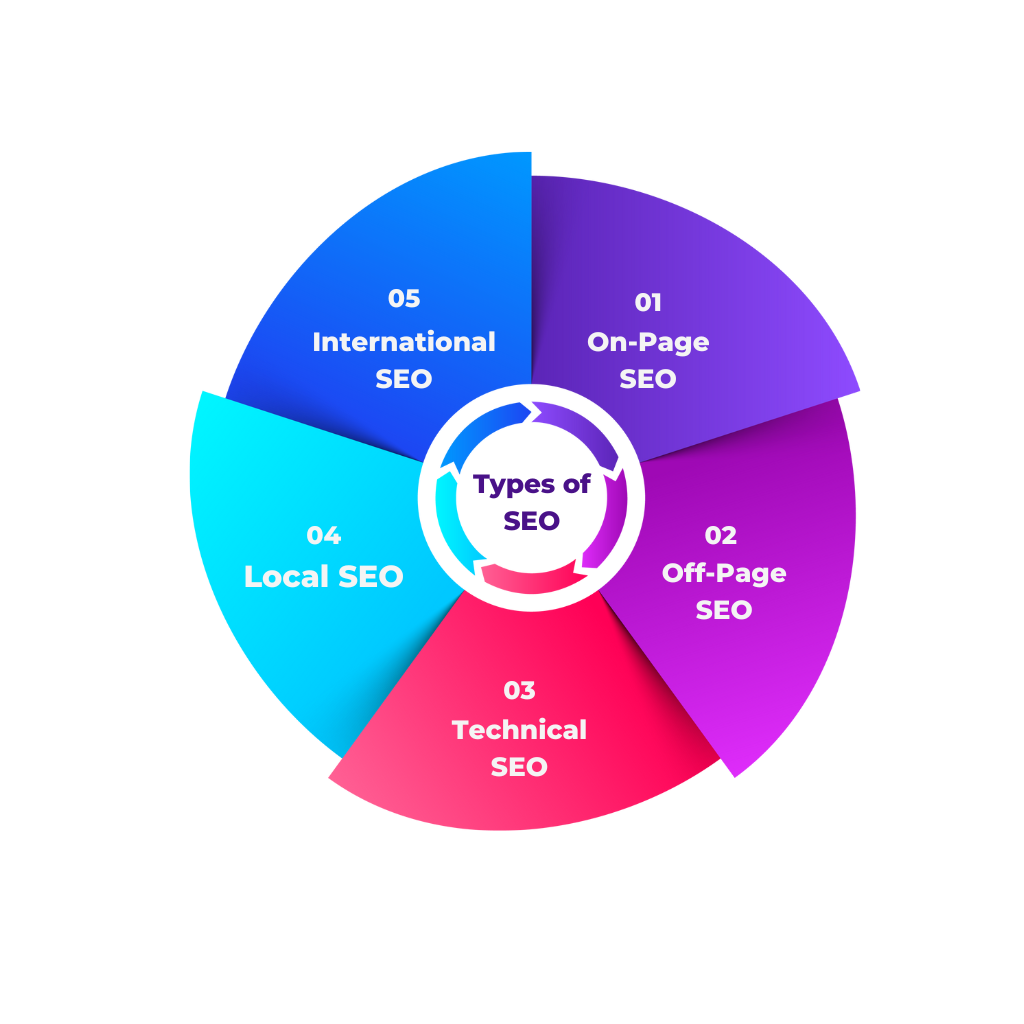What is SEO?
Search Engine Optimization (SEO) is the process of improving a website so it appears higher in search engine results pages (SERPs). The goal is to increase organic (unpaid) traffic by making your site more relevant and useful to users.In simpler terms, SEO helps people find your website on Google when they search for topics related to your content, products, or services. While the core idea sounds simple, SEO is made up of several components that work together—each addressing a different part of your online presence.
Why Understanding the Types of SEO Matters
Think of SEO like a puzzle—each piece is essential to see the full picture. Focusing on just one type, like writing good content, won’t be enough if your website is too slow or doesn’t have backlinks.
Knowing the different types of SEO ensures you’re covering all the angles, from your content and website structure to how people link to and discover your site.
Now let’s dive into the 5 main types of SEO that every beginner should know.

1. On-Page SEO
On-page SEO (also called on-site SEO) refers to the optimization of content and HTML source code on individual pages of your website.
Key Elements:
Keyword optimization: Using relevant keywords in titles, headers, and body content.
Meta tags: Crafting SEO-friendly title tags and meta descriptions.
Content quality: Providing valuable, well-structured, and original content.
Internal linking: Linking to related pages within your own site to guide users and boost SEO.
Image optimization: Compressing images and using descriptive alt text.
Why It Matters:
Google rewards websites that provide clear, relevant, and well-organized content. On-page SEO tells search engines what your page is about and helps users find answers easily.
2. Off-Page SEO
Off-page SEO refers to all the activities that happen outside your website to improve its search rankings.
Key Tactics:
Backlink building: Getting reputable websites to link to your content.
Social signals: Shares, likes, and mentions on social media platforms.
Brand mentions: Even unlinked brand mentions can contribute to your SEO authority.
Guest posting: Writing articles for other websites in your niche.
Why It Matters:
Backlinks are one of the top ranking factors in Google’s algorithm. Off-page SEO boosts your website’s authority and trust, which can significantly improve your rankings.
3. Technical SEO
Technical SEO focuses on the behind-the-scenes elements that help search engines crawl, index, and display your site correctly.
Key Factors:
Website speed: Faster sites improve user experience and rankings.
Mobile-friendliness: With mobile-first indexing, responsive design is crucial.
SSL certificate (HTTPS): Securing your site builds trust with both users and search engines.
Clean site structure: Using simple URLs, breadcrumbs, and XML sitemaps.
Fixing crawl errors: Monitoring Google Search Console for issues like broken links or duplicate content.
Why It Matters:
Even the best content can go unnoticed if search engines can’t access or understand it. Technical SEO ensures your site is healthy and discoverable.
4. Local SEO
Local SEO helps businesses show up in local search results—for example, when someone types “coffee shop near me” or “best plumber in Mumbai.”
Key Practices:
Google Business Profile optimization
Consistent NAP (Name, Address, Phone Number) across directories
Local keywords and service-based content
Customer reviews and ratings
Why It Matters:
If you run a physical store or offer local services, local search optimization is vital to appear in map results and local listings. It brings real foot traffic and highly targeted leads.
5. International SEO
International SEO is for websites targeting users across different countries or languages.
Important Steps:
Hreflang tags: Help search engines deliver the right language version of your site.
Localized content: Tailoring content to cultural norms and user expectations.
Country-specific domains or subdirectories: e.g.,
example.co.ukfor the UK audience.
Why It Matters:
For global brands or multilingual websites, international SEO helps you reach audiences in multiple regions without confusing search engines or users.
Bringing It All Together: Creating a Well-Rounded SEO Strategy
SEO is most effective when all parts work together:
Start with solid technical SEO to ensure your site is crawlable.
Build strong on-page SEO through helpful, keyword-rich content.
Boost your credibility with off-page SEO tactics like backlinks.
Don’t ignore local or international SEO if your business model requires it.
